Writers spend a lot of time on their opening paragraphs, and rightly so. Then we stand on the corner, displaying our wares under a streetlamp, waiting for a reader (or agent, or editor) to drive by. When they slow down, or stop at a red light, we boldly slink out to the curb, holding the first manuscript page of our novel up to the car window, pointing to that first seductive sentence, the alluring opening paragraph, the irresistible hook that will charm them into opening the passenger door and inviting us in. Hooker and hookee, together at last in a kind of erotic literary eHarmony dream.
But—and I apologize if you wanted me to pursue this dream further—what about the final paragraph of the novel? How about that moment on page 324 when you’re exhausted from months of writing, and the plot’s resolved, and the characters have done about all the damage you can handle, and it’s time to end the damn thing? Do you have the creative energy and vision left to write a strong ending? After all the blood, sweat, and tears, maybe you owe it to yourself, and to your story, to write a great ending.
Let’s look at a few famous endings in fiction and see what we can learn. You’ll have your own favorite endings, the ones that have influenced your own writing, whether consciously or not, but these are some of mine.
At the end of Gone With the Wind, after a thousand pages of life with Scarlett and Rhett and friends, after all the triumphs and defeats, all the living and suffering and dying, what image does Margaret Mitchell leave us with? It’s Scarlett O’Hara alone, because Rhett Butler has just walked away from her life again, rejecting her at the end of a long dialogue scene in which the two revisit their past and current feelings. After Rhett disappears up the stairs, and out of her life again, Scarlett is left alone, and in these final moments of chapter 63, and the novel, we are inside the heroine’s mind. Here are the last two paragraphs.
With the spirit of her people who would not know defeat, even when it stared them in the face, she raised her chin. She could get Rhett back. She knew she could. There had never been a man she couldn't get, once she set her mind upon him.
"I'll think of it all tomorrow, at Tara. I can stand it then. Tomorrow, I'll think of some way to get him back. After all, tomorrow is another day."
And as I sat there brooding on the old, unknown world, I thought of Gatsby’s wonder when he first picked out the green light at the end of Daisy’s dock. He had come a long way to this blue lawn, and his dream must have seemed so close that he could hardly fail to grasp it. He did not know that it was already behind him, somewhere back in that vast obscurity beyond the city, where the dark fields of the republic rolled on under the night.
Gatsby believed in the green light, the orgastic future that year by year recedes before us. It eluded us then, but that’s no matter—tomorrow we will run faster, stretch out our arms farther. . . . And one fine morning—
So we beat on, boats against the current, borne back ceaselessly into the past.
E. B. White’s classic Charlotte’s Web, which opens with Fern saving the runt pig Wilbur from the ax, ends with a hymn to friendship. Wilbur tells Charlotte’s children about their mother, and White writes simply and beautifully of the passing of the seasons, and generations, on the farm. Wilbur’s farm. Home. This last image, of Wilbur happy and surrounded by friends, and remembering Charlotte, brings the book to a perfect end. The final paragraph is a lesson for writers in the elements of style, in the power of a few words:
Wilbur never forgot Charlotte. Although he loved her children and grandchildren dearly, none of the new spiders ever quite took her place in his heart. She was in a class by herself. It is not often that someone comes along who is a true friend and a good writer. Charlotte was both.
What about endings for short stories? I believe the same principles apply as for novels. Two of my favorite short stories are from Dubliners. Both end with what James Joyce called an epiphany, a moment of revelation and insight, “a sudden spiritual manifestation.” In Joyce’s “Araby,” the young narrator with a deep crush on Mangan’s sister makes a difficult journey to buy a promised gift for her at the Araby bazaar. The boy fails in his romantic quest, however, arriving as the bazaar is closing and without enough money for something nice. At the end of the story we see him in the darkness of the closing bazaar, as Joyce delivers the epiphany in one concluding sentence: “Gazing up into the darkness I saw myself as a creature driven and derided by vanity; and my eyes burned with anguish and anger.” Again, a sharp image of the central character, evoking strong emotion.
In “The Dead,” Joyce is at his best, writing a longer story with a deeper epiphany. It begins simply with Gabriel Conroy, the central character, attending a Christmas party thrown by his aunts, and ends dramatically with a scene between Gabriel and his wife, Gretta. After the party they ride out a snowstorm in a hotel room, where Gretta tells Gabriel that the song that moved her at the party was the song that a young man she once loved greatly used to sing, a man who died for love of her. Gretta lies crying on the bed, and finally falls asleep while Gabriel gazes out at the snow and experiences his spiritual moment of insight.
Generous tears filled Gabriel's eyes. He had never felt like that himself towards any woman, but he knew that such a feeling must be love. The tears gathered more thickly in his eyes and in the partial darkness he imagined he saw the form of a young man standing under a dripping tree. Other forms were near. His soul had approached that region where dwell the vast hosts of the dead. He was conscious of, but could not apprehend, their wayward and flickering existence. His own identity was fading out into a grey impalpable world: the solid world itself, which these dead had one time reared and lived in, was dissolving and dwindling.
A few light taps upon the pane made him turn to the window. It had begun to snow again. He watched sleepily the flakes, silver and dark, falling obliquely against the lamplight. The time had come for him to set out on his journey westward. Yes, the newspapers were right: snow was general all over Ireland. It was falling on every part of the dark central plain, on the treeless hills, falling softly upon the Bog of Allen and, farther westward, softly falling into the dark mutinous Shannon waves. It was falling, too, upon every part of the lonely churchyard on the hill where Michael Furey lay buried. It lay thickly drifted on the crooked crosses and headstones, on the spears of the little gate, on the barren thorns. His soul swooned slowly as he heard the snow falling faintly through the universe and faintly falling, like the descent of their last end, upon all the living and the dead.
So there we have it. Five endings, all with powerful images and emotions and focused on the central characters who have been at the heart of the story. Notice that these are examples of denouement—that often quiet, reflective period following the climax of the plot. The story has reached afterglow, the golden hour, the last light of day between sunset and evening.
When I’m writing a short story or novel, and have resolved the conflict, I find myself naturally writing by that last light of day, adding a short scene or paragraph that inevitably is influenced and inspired by dozens of favorite endings. As the cowboy rides off into the sunset, his battles won, what is he thinking? Perhaps he stops and looks back at the town and gives a final wave. Or maybe, just maybe, he turns and rides back into town and, without stopping, sweeps the blonde saloon girl off her feet, just when she feared she would never see him again. Now there’s an image I like.



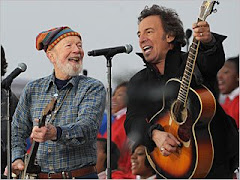


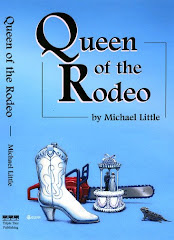

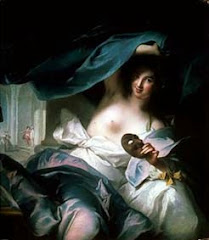


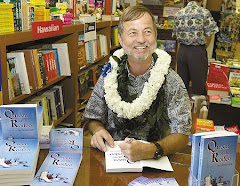

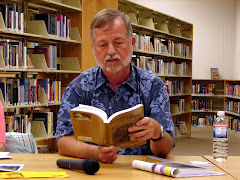
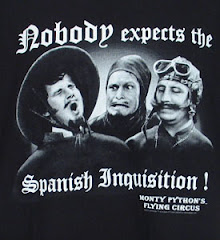
1 comment:
Another ending to add to the list is that of Anne Pigone's "The Ugly" Does it sound familiar?
...
—Shush my darling, she said with her finger to her lips – you'll wake up the entire hotel.
—Gabby?
—Sorry baby, gut reaction. But now you know how it feels.
—How what feels? his voice still trembling from the pain.
—Well for starters: Here we are, you and I, alone together in a relatively nice hotel room, if one can ignore the botanical wallpaper, without the kids, just the two of us, finally free from all that shit out there. And tonight at the reception when they played A Thousand Miles Away and we danced with each other and I thought to hell with all these people because it's after all just the two of us ... and 20 minutes ago I was feeling pretty horny – I can hardly move my eyelids, but I was keeping them wide for you, baby – I was feeling horny for you, and that was the only thing keeping me awake and you – it turns out, are a thousand miles away, or ten thousand, thinking about some girl you couldn't get it up for 20 years ago. You get it now?
—But it has nothing to do with us.
—Oh really? Nothing to do with us? Wasn't it we who are shallow, cowardly, circumstantial? Phonies, fakes, hypocrites? Wasn't it we you meant?
—No, not you Gabby.
—What are we, Garett? We are what we see and smell and touch: that's our world. And beauty – it's our judge and our judgment. And it also happens to be how I make my living – our living I might add. I work on that shallow, superficial, skin-deep surface you are slamming. Appearances, packaging, that's my trade – and guess what: it's for real. Reality is on that surface. And all that da da da fire sermon shit is a bunch of pretentious hot-air crap; an abyss – a void. You can't go there and you can't live there. We ain't Buddhas, baby – we're consumers. We consume and then we die. In the profound words of the waitress: Enjoy! And for god sakes, stop moping about it.
She sat on the bed, plucking at a lone strand of hair on her thigh – an escapee from her last wax job. Garett stared at the ceiling. Tears now rounded his cheeks falling to his pillow. My poor darling, we are all circumstance – by birth, by fate. Of course it's not fair. Power's not fair. Wealth is not fair. Beauty? No way José. Only death is fair. Death trumps all and beauty, yes. But whats' the big deal, Garett? We're only snowflakes, butterflies with our little ephemeral moments of glory – our circumstantial, ephemeral moments. And then ...
She laid herself flat-out on the bed so close to her husband that she could feel his warmth but not touching, and closed her eyes. Slumberous flakes of snow, silver and dark, fell over her body, Garett's body, and all the sleeping and sleepless bodies of the Hotel Boulderado. It truly was snowing everywhere. Snowflakes from stars and moons everywhere falling like comets or dust or nothing. Falling on us all. Falling upon the beautiful and the ugly, the real and the counterfeit, the living and the dead.
Post a Comment